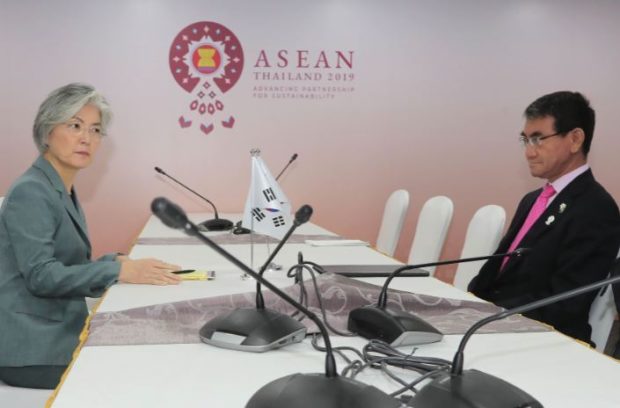Top diplomats of S. Korea, Japan fail to defuse trade, diplomatic tensions
SEOUL — South Korea and Japan failed to defuse a deepening trade and diplomatic row on Thursday, the eve of Tokyo’s widely expected decision to strip Seoul of a preferential trade status in a move sure to aggravate the already high tensions.
After the talks with her Japanese counterpart, Taro Kono, in Thailand ended with little progress, Foreign Minister Kang Kyung-wha warned that Seoul could reconsider a rare line of bilateral security cooperation if Tokyo presses ahead to remove South Korea from its “whitelist” of trusted trade partners.
Kang and Japanese Foreign Minister Taro Kono met on the margins of annual multilateral talks involving the 10-member Association of Southeast Asian Nations (Asean).
“(I) clearly made the request (not to remove South Korea from the whitelist), and clearly stated that should that decision be made, there would be grave ramifications on the bilateral relations,” Kang told reporters after the 45-minute talks.
“Japan has taken the export control measure, citing security reasons. I said that we cannot help but review various frameworks of security cooperation between South Korea and Japan,” she added.
Kang was referring to a bilateral military intelligence-sharing accord. Seoul has hinted that it could review whether to retain the accord, which is supposed to be automatically renewed unless either side opposes the renewal.
During a Cabinet meeting, Tokyo is expected to finalize its decision on whether to drop South Korea from the whitelist of 27 countries given preferential treatment in purchasing Japanese dual-use products that can be diverted for military use.
The removal, if realized, will further aggravate tensions caused by Japan’s July 4 imposition of tighter restrictions on exports of three high-tech materials vital to the manufacturing of semiconductors and displays.
Tokyo has justified its export control measure, accusing Seoul of laxity in its export control and citing an “erosion of trust” in bilateral relations.
“If countries have problems, they should seek a solution through consultations, and (I) clearly said that there needs to be time and room (for us) to make such efforts,” Kang said.
An official at Seoul’s foreign ministry said that there “did not appear to be any big change” in Tokyo’s position over the ongoing trade row. He also said that chances appear “considerable” that Japan would press ahead with its move to drop Seoul from the whitelist.
“I can say that the gaps between the two sides still appear to be considerable,” the official told reporters on condition of anonymity.
Seoul believes Tokyo’s recent export curbs are political reprisal for last year’s Supreme Court rulings that ordered Japanese firms to compensate South Korean victims of forced labor during Japan’s 1910-45 colonization of the peninsula.
An escalation of the trade dispute could pose a difficult quandary to the United States, which has been seeking to tighten security cooperation with its two Asian allies, particularly in the wake of the North’s recent missile launches.
In an apparent move to help the two allies patch things up, the US has reportedly called for South Korea and Japan to consider signing a “standstill” agreement to give them more time to negotiate a solution.
But Japanese Chief Cabinet Secretary Yoshihide Suga denied reports that the US had asked Japan and South Korea to mull such an agreement.
Kang is poised to use a series of Asean-related meetings to highlight the importance of free trade principles as part of Seoul’s diplomacy to stop Japan’s recent export restrictions and its consideration of additional retaliatory steps.
On Thursday, Kang was set to attend the South Korea-Asean foreign ministers’ meeting. Aside from the multilateral talks, she also met bilaterally with Chinese Foreign Minister Wang Yi and her counterparts from Brunei and the European Union.
The following day, she will join the Asean Plus Three meeting, which includes South Korea, China and Japan; the East Asia Summit (EAS) session and the Asean Regional Forum (ARF). On Saturday, she is to attend the South Korea-Mekong foreign ministers’ meeting. Yonhap
